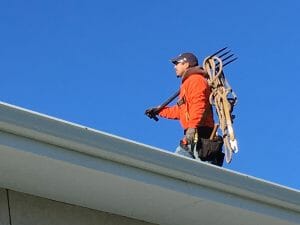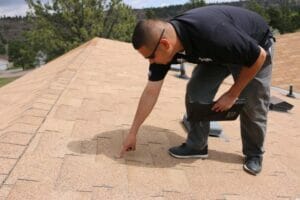Should I Hire my Insurance Companies’ Roofer or an independent roofer?

Professional Independent Roofer
This is part two of whether or not you should hire your insurance companies’ roofer. Click here to view the information on the first post. Every vendor that is roofing Colorado Springs knows whether the following items are hypothetical or not. I happen to see the following information as experiential. Insurance companies are not the bad guys, they’re smart and as such the bottom line matters. Is it possible that your claim has something to do with the bottom line of your insurer?
Colorado House Bill 07-1104 Concerning referral by an insurance company of an insured to a property repair business
One of the purposes of this bill is to protect free trade in Colorado by preventing big business from controlling the market. This bill prohibits unfair and discriminatory insurance practices that impede free trade in the state of Colorado.
What if the insurance company exerts control over a roofing contractor to perform repairs instead of a total replacement?
When the insurer determines the scope of work, rather than a qualified contractor, the insurers logical incentive is to minimize expenses resulting in the potential of a rather narrow scope of work.
The following scenario happens time and time again. The homeowner chooses to go with the insurance companies preferred roofer. The insurance companies roofer comes out and evaluates the scope of work based upon insurance protocol and deems that a partial roof replacement or repair is satisfactory. At other times, the adjuster comes out and recommends the repair and the preferred roofing contractor will do as instructed.

HAAG certified roof inspector for an independent roofing company
The savvy homeowner gets the insurance claim summary report and decides to contact a reputable roofer for a second opinion. At the time of the inspection a determination is made based upon Haag Engineering roof inspection protocol that the entire roof has functional damage and the roof should be replaced. This experienced roofer that isn’t affiliated with the insurance company will bring to the attention of the insurance company the result of their findings and ask for a second inspection. Now, the homeowner has someone on their roof that is working directly for them.
A roofer is not an adjuster
A reputable roofing contractor has the ability to work directly for the homeowner without any strings attached to an insurance company. Every roofer that is listed on an insurance companies network of providers has a string attached to the insurance company and not the homeowner. A point of clarification is that a contractor isn’t allowed to function as an adjuster. These two can not be confused.
How does the insurance company respond to inferior work of a contractor on their network program?
I’ve read data from bad faith lawsuits that are tied to preferred contractor programs and the results may not be good for a homeowner. What I’m saying is, “if the insurance companies preferred roofer performs poorly and it results in a financial loss you’ll probably have to enter into litigation against both the contractor and insurance company.” The insurance companies vendor program clearly states they are not responsible for the outcome of the contractor’s work. How does a homeowner benefit from using a contractor on a vendor’s program when the very benefits that should be afforded to you are not realized?
Does the insurance preferred roofer work for you, the insurance company or another firm?
Insurance companies hire a firm that oversees companies that provide services for insurance companies risks. These providers range from glass installers, chimney repair men, painters, emergency water extraction, carpenters and roofers. The insurance company doesn’t oversee these companies they contract with a management company to oversee all of the contractors on the preferred vendors list.
How much money does it cost this roofer to be on a preferred vendors network?

It cost a roofer 10% of the job gross to be on some vendor programs
Vendors on many of the insurance companies preferred provider list pay a percentage of the claim to the overseeing provider to be on the vendors list. Yes, that’s right the roofing company that is on the insurance companies preferred vendors list gives up a percentage of income to be an insurance provider. The roofing company may see this as a great benefit because their volume of work increases significantly.
Denver roofing companies that are insurance providers are placed under a great deal of stress and time constraints to perform exactly as the contract states. Preferred roofing companies depend upon continued insurance work. When confronted with what’s best for the homeowner, it’s easier to remain silent and do what the insurance company has instructed them to do. How does this benefit a homeowner? It doesn’t.
Contract law will prohibit the roofer from revealing sensitive information about policies and procedures of the inner workings and arrangements between the roofer and insurance company. Hey, I’m not being a conspiracy theorists, but who’s to say that this is really best for you? You’ll have to decide, if the insurance companies roofing contractor withholds information how that might be beneficial to you. The insurance companies roofer works for the insurance company and not you.
To confirm whether or not my information is accurate, please look online at attorney’s that litigate against insurance companies and you’ll see that this information is indeed factual.
Tell me more
This is my perspective and only my opinion, but I see this as an issue. Let me explain. I’ll start from a slightly different angle and zero in on the answer. I live in Monument and there are several new home builders in the area. Each one of these builders that I’ve stopped by their job sites is only installing one row of ice and water shield on the eave of the roof. In Colorado Springs the governing building code jurisdiction is Pikes Peak Regional Building Department. Pikes Peak Regional Building Department requires that every living space that is above seven thousand feet to have ice and water shield installed on that property. The requirements state that the ice and water shield is to be installed on the eave of the property. The Monument Colorado home builders are installing ice and water shield on the eave of these roofs. Everything looks great and it appears to be installed according to code, however there’s an issues. The eaves of these homes are twenty four inches wide and the walls are approximately one foot thick once the stucco is finished. We have a total of three feet from the roof fascia to the inside of the interior wall. Code requires that the ice and water shield extend to two feet inside of the interior living space. Essentially in order for these builders to install these roofs according to building code they would need to install two rows of ice and water shield on the roofs eaves. I’ve visited many building sites in Monument Colorado and have yet to see a new home builder properly install ice and water shield per code requirements. Pikes Peak regional building department doesn’t require a mid-roof inspection so these builders allow there roofers to cheat the system. The builders don’t install the roofs they only hire roofers that make a very small amount of money per each roof install. Yet, each roofer installs a large volume of roofs per their contract so they will do this for very little profit. In essence the builder isn’t installing an inferior roof, it’s his roofer. This system will continue as long as the roofers make such a low percentage of income. The bad news is that most every new homebuyer in Monument is getting a roof that is inferior to present day building code requirements.
Vendor system
The system that the insurance companies have in place may result with similar outcomes. Let’s revisit the following information. The insurance company recommends a roofing company, yet the insurance carrier in no way guarantees the roofers work. Wow, how does that benefit you the homeowner? Maybe, it does or maybe it doesn’t benefit you at all.
The vendor program turnover rate for roofers is very high.
Ok, you say that the contractor gives a five year labor warranty. The issue isn’t that the roofer gives a five year warranty, the real issue is that the insurance company has a preferred provider list and they are not responsible for the work. So, how does it benefit you to allow a roofing contractor that is on the preferred vendors list to install your roof?
As a independent contractor, that has been roofing Colorado Springs, Integrity Roofing and Painting, LLC would recommend that you consider working with someone that has no strings attached to the insurer. Contact Integrity Roofing and Painting, LLC for your roofing needs.

